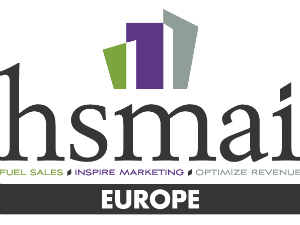HSMAI Europe Advisory Board members debate ways to find the AI sweet spot
On Monday, 11th September, European hospitality leaders from different HSMAI Europe Advisory Boards discussed the opportunities to accelerate AI knowledge and integration to empower hotel professionals and enhance the guest experience. Finding the balance between man and machine – the AI sweet spot – is crucial to future-proofing the hotel sector, leveraging technology to empower talent and guests, while retaining the “heart of hospitality”. That was the consensus of more than 40 senior hospitality leaders across the Europe region, representing different HSMAI Europe Advisory Boards, who gathered last week for a special online joint session to discuss ‘Artificial Intelligence (AI) and the Impact it has on the Hospitality Industry’. This collaborative meeting was designed to break down the silos between various advisory boards /disciplines, fostering a cohesive and synergistic approach to our discussions.
With AI advancements accelerating and generative AI, more specifically, ChatGPT, becoming more widely used globally – with 100 million users reported by the application in February – guest expectations are changing. Yet current and potential staff are not necessarily up-to-speed on AI’s potential to support their roles, leading to reticence to adopt, the advisory board noted.
As hospitality companies take on the challenge to keep pace or even catch up with AI education and implementation, it highlights the need for cross-department collaboration and communication to identify common problems and solutions and drive efficiencies. However, departments within hotel organisations still tend to work on AI strategies as a unit, rather than take an over-arching strategic approach, industry leaders acknowledged. For this reason, the HSMAI Europe Advisory Board meeting took a pan-industry approach, grouping together industry professionals from different disciplines and companies in breakout sessions to encourage knowledge sharing and brainstorming.
Encompassing leaders across sales, marketing, revenue management, human resources, and general managers, as well as high-profile hospitality education institutions, third-party hotel management firms, and vendors representing AI solutions, talent acquisition and training, and more, the session sought to break down silos between departments and to identify a clear path forward for the common good.
Here are the key takeaways from this high-level discussion:
Early adopters – revenue management takes the lead
The debate kicked off with board members outlining AI success stories, with revenue management already benefitting from AI, gathering complex data to “drive the right pricing decisions at the right time to the right customer”.
Not always identified as AI, machine learning is responsible for complex mathematical models that are “not humanly possible’, for example, analysing length-of-stay trends that in a year, amount to more than 16 million customer decisions. “A revenue manager can’t make those decisions in the same amount of time that AI can,” said one revenue management leader who highlighted its wide-ranging use to analyse historical trends, provide greater price transparency across multiple distribution channels and more.
While resource and time efficient, the skills required to input, understand and analyse data and act on it, remain wholly human, and this was the session’s overriding theme – using AI to conduct the mundane, so hospitality professionals can fulfil their roles, which in essence is “to give guests a good time”.
With revenue management taking the AI lead, the next step is to look at how that knowledge and data can be shared with and assist other departments, translating forecasting systems to operations, for example.
Quick wins – talent acquisition and communications
With the hospitality industry still recovering from the talent crisis resulting from the pandemic, HR professionals revealed generative AI was a handy tool to create job descriptions, which could then be refined.
“Using ChatGPT with several prompts helps me get across the first hurdle, saving me time,” said one talent acquisition leader, while another said she had used AI to field CVs and even remove gender-specific language from internal HR-related forms.
AI could also be used for instruction-based training for onboarding new candidates, as well as “real-time assistance” – supporting hotel staff with simple guest communications and complaints as a “first touchpoint”, alleviating frustration until guests are engaged in person.
“Generative AI can be used to synthesise data such as guest feedback, so the general manager can drive a better guest experience,” said one advisory board member.
Other quick AI wins for hospitality suggested in the discussion included analysing guest reviews and guest behaviour; basic content generation, including room descriptions; internal communications; and predictive personalisation or the “Netflix model” – using AI algorithms to automate a personalised user experience on the hotel website to drive higher conversion rates.
AI for operational efficiencies is already being widely used, with smart devices being rolled out to measure energy consumption, cited as one example.
Barriers to progress and adoption, and the need for education
Misconceptions about AI and its potential in the hospitality sector was identified as a key challenge, with leaders acknowledging they needed to become more familiar with the technology before they could empower others to use it.
Assuring staff it was a tool to support them, not replace them, was another challenge, highlighting the need to plough more investment and resources into training.
Surprisingly, although Generation Z has been shaped by the digital age, students currently attending hospitality schools “are not too keen on the tech element of the industry”, said one board member from a leading institution.
“They love the heart of hospitality and its warm feeling, which is why they chose this profession – they are not actually too keen on the tech side.”
She said many subjects, particularly revenue management, now integrated AI into the curriculum, however, the real challenge was to promote hospitality as a career to AI-savvy students.
“It needs to come across that we are selecting students in this domain because it’s important for the future of our sector.”
Many board members noted the disconnect between head office and hotels, with corporate AI strategies in place at that did not feed down to individual properties.
Similarly, departments within hospitality firms said they were in the AI “test-and -earn phase”, working primarily in silos, rather than collaborating.
Trust issues were another concern, not only from a data protection perspective, but on a human level.
“No one wants a thank you email from a robot, when they can tell it’s a robot,” said one board member. “In hospitality, sometimes it just needs to be human.”
However, one vendor pointed out that the better prompts you give AI, the better the quality, with generative AI already sophisticated enough to replicate tone of voice.
Another board member referred to a video shared by customer centricity expert Steven Van Bellegham, which stressed the new generation of chatbots were more conversational, and some were proven to show better empathy and compassion that humans, which is a true force for disruption.
“Just because we are human, it doesn’t mean we are good at being human,” said Steven, although you would hope those working in hospitality would be!
And the next steps
Advisory board members put forward several next steps for hospitality professionals to consider individually and collectively.
“Let’s start with the basics,” said one, “educating ourselves in AI and then educating others – a top-down approach”.
On the flipside, a reverse-mentoring option was put forward, bringing students on board to inform corporate strategy towards AI innovation – what future guests and talent expect in terms of AI experiences and training.
Education and changing misconceptions was a strong theme, with one supplier emphasising the importance of “helping hospitality professionals become familiar with AI”.
“We should be democratising this technology, making it available to everyone and explaining how it obliterates mundane tasks”.
Practicing what he preaches, his company provides a free generative AI solution to create rate plan descriptions, which can also be rolled out for room descriptions and copy for booking engines.
“If you are not happy with the final result, it’s still a base to work on, and with generative AI, this is where we see the most time saving and productivity. It helps with creativity, because that’s not always a strength of revenue managers, for example.”
In a similar vein, all board members agreed AI should remove repetitive tasks, but not the heart of hospitality. It should empower hotel professionals to “free up their minds” and “foster creativity”, giving them more time to focus on the skills that technology cannot replicate.
Rather than build large AI teams – another silo in effect – hotel firms should collaborate with third-party AI specialists and providers to drive innovation, however, they should educate themselves first so they know what questions to ask those suppliers.
“When it comes to AI, we need to get our hands dirty, rather than put all of our trust in the vendors,” stressed one industry veteran. “It’s now about integrating AI into our company and industry culture.”
And finally, it was agreed AI should make life easier for customers and employees, freeing up time for that all-important human interaction.
The session identified the opportunity for hospitality to better understand, adopt, and be at the forefront of AI innovation, enriching the guest and talent experience to safeguard the industry’s future prosperity.
As Steven Van Bellegham said: “Leverage the strengths of your people and leverage your digital tools – then you win the heart and the business of your customers.”
HSMAI Europe will follow up these discussion with a local event, starting with London on Wednesday evening, 25th October 2023.
Furthermore, this will be taken even further at HSMAI ROC Europe in London on Thursday, 18th January 2024.



























